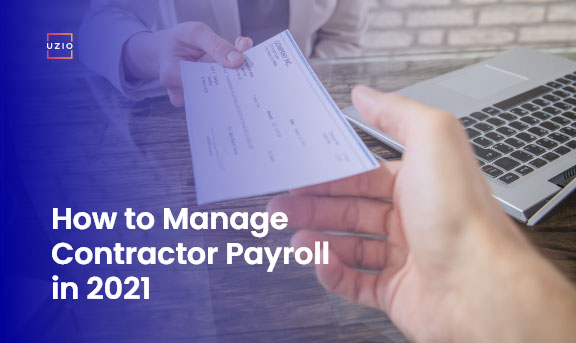
How to Manage Contractor Payroll in 2021
Quick links
-
Why should you care about managing contractor payroll?
-
Contractors – Are they equivalent to your employees?
-
Contractors payroll management
-
What are my obligations?
-
How can UZIO help?
Since the advent of online platforms that allow independent contractors to find jobs and employers to hire them, contractor payroll has become an important task for many managers in charge of managing their company’s finances. Contractor payroll in 2021 is different from how it was managed 10 years ago, as tax laws change and the ways in which employers pay contractors to change with them.
Payroll can be complicated even in the most traditional employment situations, but it can become much more so when dealing with independent contractors and their unique tax situations and payroll requirements. Knowing how to manage contractor payroll will help you make sure that your business is paying its contractors the amount of money it owes while also ensuring that it isn’t falling short on any of its federal or state tax obligations. Here is some advice you must keep in mind before hiring a contractor.
Why should you care about managing contractor payroll?
It’s easy to put off managing contractor payroll. But it can really come back to bite you if your contractors work outside of your company for more than a few months and don’t meet specific criteria. Sometimes even a scanty mistake can lead to sumptuous penalties that may affect you severely if you are a small business.
Contractors – Are they equivalent to your employees?
How you classify workers can have a profound impact on your bottom line. Make sure you know what you’re dealing with so that your tax obligations match up with your business structure. There are many factors at play, including whether they receive benefits from their job and whether they work at an office. This breakdown of how to manage contractor payroll for independent contractors will help clarify matters and ensure that you are compliant with IRS laws and regulations.
Contractors payroll management
As an employer, you’re required to pay payroll taxes on behalf of your independent contractors. The Internal Revenue Service (IRS) classifies workers as employees or contractors depending on how much control your company has over their work. So, what does it mean for a worker to be an independent contractor? The IRS has some factors that determine whether a worker is an employee or contractor: Behavioral control: Are you telling them what hours they have to work? Financial control: Do you set their salary and tell them when and how much they will be paid? These are a few examples of when financial control can be relevant; not every business owner will apply these same rules. Whether your company exercises behavioral or financial control over a worker matters more than anything else
What are my obligations?
The first step is to understand your responsibilities for managing a contractor’s payroll. The IRS says you’re required to withhold federal taxes from their paychecks, regardless of whether they’re an employee or an independent contractor. It’s also your responsibility to calculate and collect any taxes on payments made by 1099 contractors. When it comes time for your contractors to file taxes, you should send them Form 1099-MISC at year-end with details about their income; that form includes information about payments made during that tax year.
If you fail to withhold Medicare taxes from independent contractors who don’t have a Social Security number or ITIN, you could be hit with a hefty fine. Similarly, if you fail to contribute towards unemployment insurance premiums on time because they’re misclassified as 1099 contractors when they should be employees with W-2 forms, your business could wind up paying fines equal to 15 percent of what would have been paid had the taxes been paid on time.
How can UZIO help?
While independent contractors can be appealing from a business perspective because they cost less than employees, businesses that contract them are required by law to withhold taxes and contribute various types of insurance. UZIO helps you classify your contractors on the basis of your requirement and handles payroll & taxes on your behalf to ensure compliance in an automated fashion. This minimizes your effort to little or nothing at all. Get a one-on-one interactive session with one of our payroll experts today and get access to a 30-day obligation-free trial.





